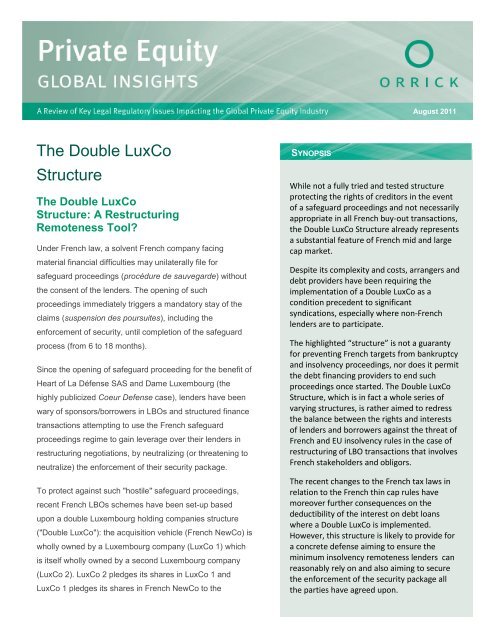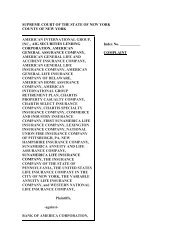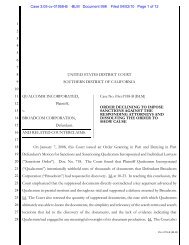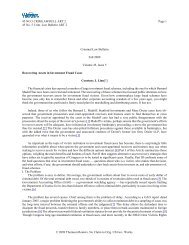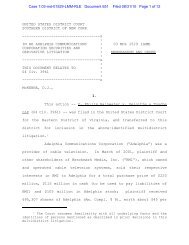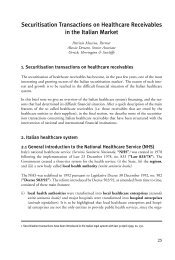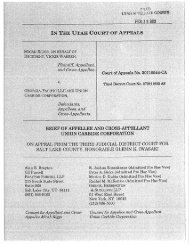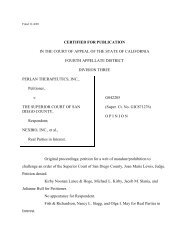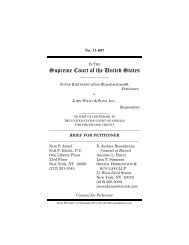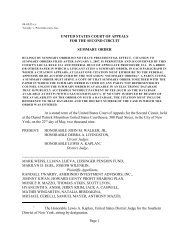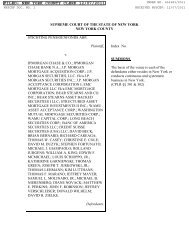PE Newsletter The Double LuxCo Structure (August 2011)
PE Newsletter The Double LuxCo Structure (August 2011)
PE Newsletter The Double LuxCo Structure (August 2011)
You also want an ePaper? Increase the reach of your titles
YUMPU automatically turns print PDFs into web optimized ePapers that Google loves.
<strong>August</strong> <strong>2011</strong><br />
<strong>The</strong> <strong>Double</strong> <strong>LuxCo</strong><br />
<strong>Structure</strong><br />
<strong>The</strong> <strong>Double</strong> <strong>LuxCo</strong><br />
<strong>Structure</strong>: A Restructuring<br />
Remoteness Tool?<br />
Under French law, a solvent French company facing<br />
material financial difficulties may unilaterally file for<br />
safeguard proceedings (procédure de sauvegarde) without<br />
the consent of the lenders. <strong>The</strong> opening of such<br />
proceedings immediately triggers a mandatory stay of the<br />
claims (suspension des poursuites), including the<br />
enforcement of security, until completion of the safeguard<br />
process (from 6 to 18 months).<br />
Since the opening of safeguard proceeding for the benefit of<br />
Heart of La Défense SAS and Dame Luxembourg (the<br />
highly publicized Coeur Defense case), lenders have been<br />
wary of sponsors/borrowers in LBOs and structured finance<br />
transactions attempting to use the French safeguard<br />
proceedings regime to gain leverage over their lenders in<br />
restructuring negotiations, by neutralizing (or threatening to<br />
neutralize) the enforcement of their security package.<br />
To protect against such "hostile" safeguard proceedings,<br />
recent French LBOs schemes have been set-up based<br />
upon a double Luxembourg holding companies structure<br />
("<strong>Double</strong> <strong>LuxCo</strong>"): the acquisition vehicle (French NewCo) is<br />
wholly owned by a Luxembourg company (<strong>LuxCo</strong> 1) which<br />
is itself wholly owned by a second Luxembourg company<br />
(<strong>LuxCo</strong> 2). <strong>LuxCo</strong> 2 pledges its shares in <strong>LuxCo</strong> 1 and<br />
<strong>LuxCo</strong> 1 pledges its shares in French NewCo to the<br />
SYNOPSIS<br />
While not a fully tried and tested structure<br />
protecting the rights of creditors in the event<br />
of a safeguard proceedings and not necessarily<br />
appropriate in all French buy-out transactions,<br />
the <strong>Double</strong> <strong>LuxCo</strong> <strong>Structure</strong> already represents<br />
a substantial feature of French mid and large<br />
cap market.<br />
Despite its complexity and costs, arrangers and<br />
debt providers have been requiring the<br />
implementation of a <strong>Double</strong> <strong>LuxCo</strong> as a<br />
condition precedent to significant<br />
syndications, especially where non-French<br />
lenders are to participate.<br />
<strong>The</strong> highlighted “structure” is not a guaranty<br />
for preventing French targets from bankruptcy<br />
and insolvency proceedings, nor does it permit<br />
the debt financing providers to end such<br />
proceedings once started. <strong>The</strong> <strong>Double</strong> <strong>LuxCo</strong><br />
<strong>Structure</strong>, which is in fact a whole series of<br />
varying structures, is rather aimed to redress<br />
the balance between the rights and interests<br />
of lenders and borrowers against the threat of<br />
French and EU insolvency rules in the case of<br />
restructuring of LBO transactions that involves<br />
French stakeholders and obligors.<br />
<strong>The</strong> recent changes to the French tax laws in<br />
relation to the French thin cap rules have<br />
moreover further consequences on the<br />
deductibility of the interest on debt loans<br />
where a <strong>Double</strong> <strong>LuxCo</strong> is implemented.<br />
However, this structure is likely to provide for<br />
a concrete defense aiming to ensure the<br />
minimum insolvency remoteness lenders can<br />
reasonably rely on and also aiming to secure<br />
the enforcement of the security package all<br />
the parties have agreed upon.
<strong>August</strong> <strong>2011</strong><br />
lenders providing debt facilities to French NewCo and the<br />
target group in connection with the acquisition.<br />
Luxembourg is a key jurisdiction for finance parties as it is<br />
more lender-friendly and since it offers greater flexibility<br />
regarding enforcement of securities. Moreover,<br />
reorganization and insolvency proceedings in Luxembourg<br />
are rarely applied in practice. <strong>The</strong>re is no real culture of a<br />
"fresh start" in Luxembourg, which may explain why this<br />
option is often rejected to the court.<br />
However, French courts may, based upon Article 3 of the<br />
EC regulation no. 1346/2000 of 29 May 2000 on insolvency<br />
proceedings (the "EC Regulation no. 1346/2000"), open<br />
safeguard proceedings in respect of <strong>LuxCo</strong> 1 and <strong>LuxCo</strong> 2<br />
and therefore trigger a stay in proceedings against that<br />
company if it concludes that the COMI ("center of main<br />
interests") of such company is located in France.<br />
In such a case and only where a <strong>Double</strong> <strong>LuxCo</strong> structure<br />
has been set-up, Article 5 of the EC Regulation no.<br />
1346/2000 should, in theory, allows (even where <strong>LuxCo</strong> 1 is<br />
subject to a hostile safeguard) the <strong>LuxCo</strong> 1 share pledge to<br />
be spared from the effects of the French insolvency<br />
proceedings to the extent those shares are effectively<br />
located outside of France: under the above-mentioned<br />
provisions, and subject to certain exceptions, the opening of<br />
insolvency proceedings in one member state does not affect<br />
de in rem rights and securities (broadly, mortgages, liens<br />
and charges) of creditors or third parties over assets<br />
belonging to the debtor which are situated within the<br />
territory of another Member State at the time of the opening<br />
of the insolvency proceedings. Rights in rem will be<br />
governed by the applicable national legislation governing<br />
those rights. <strong>The</strong>y are shielded from the application of the<br />
insolvency law of the Member State in which the<br />
proceedings are initiated. <strong>The</strong> <strong>Double</strong> <strong>LuxCo</strong> structure<br />
seeks to achieve such goal by requiring the <strong>LuxCo</strong> 1 share<br />
register be held in escrow in Luxembourg.<br />
<strong>The</strong> <strong>Double</strong> <strong>LuxCo</strong> <strong>Structure</strong>:<br />
Additional Contractual Protection<br />
<strong>The</strong> <strong>Double</strong> <strong>LuxCo</strong> structure relies in fact on a series of<br />
varying structures and LBO lenders are willing to secure<br />
additional protection by means of contractual agreements<br />
negotiated among the parties. Such agreements may<br />
provide, for example:<br />
<br />
<br />
that the enforcement of the <strong>LuxCo</strong> 1’s share pledge<br />
is subject to an earlier trigger than the other<br />
security, for example, following delivery of an<br />
acceleration notice, whether or not this acceleration<br />
can be enforced in light of insolvency proceedings<br />
opened in relation to French NewCo. <strong>The</strong> aim is to<br />
facilitate enforcement of the <strong>LuxCo</strong> 1 share pledge<br />
at a time where acceleration of the debt at French<br />
NewCo level is impossible due to a stay of<br />
proceedings against French NewCo pursuant to a<br />
hostile safeguard. However, the acceleration of the<br />
<strong>LuxCo</strong> 1 share pledge by any event of default is a<br />
matter of serious concern for the sponsors and<br />
subordinated debt providers and has to be<br />
addressed by the intercreditor agreement;<br />
for a new type of mandatory prepayment event: any<br />
decision or proposal to change the corporate<br />
governance rules ("adverse corporate decision") of<br />
both <strong>LuxCo</strong> 1 and <strong>LuxCo</strong> 2 or French NewCo (e.g.<br />
the corporate decision to file for safeguard<br />
proceedings) automatically results in an immediate<br />
obligation to repay all the debt in full so as to<br />
ensure the lenders that, if they ever were to enforce<br />
their pledge and take control of <strong>LuxCo</strong> 1, they<br />
would be able to control key corporate decisions<br />
relating to French NewCo. In some transactions, an<br />
adverse corporate decision may also occur if<br />
attempts are made to circumvent the <strong>Double</strong> <strong>LuxCo</strong>
<strong>August</strong> <strong>2011</strong><br />
<br />
structure, for example by moving the COMI of the<br />
Luxembourg companies to France;<br />
that the security agent can exercise voting rights<br />
attached to the shares, including prior enforcement<br />
of the pledge. <strong>The</strong> purpose here is to allow the<br />
replacement of the existing management of the<br />
French NewCo so to control or cease a hostile<br />
safeguard, though, the French NewCo’s new<br />
management will have to satisfy the Court that the<br />
difficulties justifying the commencement of such<br />
proceedings are no longer applicable or propose an<br />
acceptable safeguard plan.<br />
Pursuant to the New Rules, the scope of thin capitalization<br />
limitations is extended to loan facilities made available by<br />
third-parties (including third-party banks) guaranteed either<br />
by (i) an entity that is related to the borrower, or by (ii) a<br />
non-related third-party if that third-party is itself guaranteed<br />
by an entity that is related to the borrower.<br />
<strong>The</strong> New Rules generally apply to interest expenses<br />
incurred during fiscal years closed on or after December 31,<br />
2010 in respect of loan facilities granted as of, or prior to,<br />
such date. By exception, they do not apply to:<br />
bonds issued as part of a public offering;<br />
Tax Concerns: the Impact of the<br />
Tightening of French Thin Cap Rules<br />
<strong>The</strong> <strong>Double</strong> <strong>LuxCo</strong> structure may be adversely impacted by<br />
the amendments to the French thin capitalization rules<br />
introduced by the Finance Law for <strong>2011</strong> (the "New Rules").<br />
As a reminder, French thin capitalization rules provide for<br />
various limitations in respect of the deductibility for French<br />
tax purposes of interest expenses incurred by French<br />
borrowing companies on loan facilities made available by<br />
entities related to the borrower. In particular, where the<br />
amount of interest expenses simultaneously exceed (i) the<br />
relevant interest rate assessed on 1.5 times the net equity<br />
of the borrower and (ii) 25% of the borrower’s profits before<br />
taxes (increased by the relevant interest expenses), the<br />
portion of the interest expenses exceeding the higher of<br />
these two limits would not be deductible for French tax<br />
purposes in the fiscal year during which the interest<br />
expenses are incurred, unless such portion is less than<br />
€150,000. <strong>The</strong> non-deductible portion may be deducted<br />
under the same conditions in the subsequent fiscal years,<br />
but a 5% discount would be applied on the carried-over<br />
interest expenses in each fiscal year following the second<br />
fiscal year.<br />
third-party loan facilities made available pursuant to<br />
loan agreements entered into prior to January 1,<br />
<strong>2011</strong> whose purpose is to finance or refinance the<br />
acquisition of shares;<br />
third-party loan facilities whose purpose is to<br />
refinance a pre-existing debt, the repayment of<br />
which became mandatory due to the change of<br />
control of the borrower (up to an amount equal to<br />
the outstanding debt plus accrued interest);<br />
such portion of third-party loan facilities whose<br />
repayment is exclusively secured (otherwise than<br />
with pledges on the borrower’s assets) with (i) a<br />
pledge on the borrower’s shares or receivables, or<br />
(ii) a pledge on the shares issued by a company<br />
controlling (directly or indirectly) the borrower,<br />
provided however that the pledgor and the borrower<br />
are included in the same French tax consolidated<br />
group.<br />
Pursuant to the <strong>Double</strong> <strong>LuxCo</strong> structure, <strong>LuxCo</strong> 2 would<br />
pledge its shares in <strong>LuxCo</strong> 1 so as to secure the loan facility<br />
made available by third-party banks to the French borrower.<br />
To the extent that Luxco 2 does not establish a branch in
<strong>August</strong> <strong>2011</strong><br />
France, it would not be able to become a member of a<br />
French tax consolidated group and the above mentioned<br />
fourth exception would therefore not be applicable.<br />
As a result of the New Rules, as regards <strong>Double</strong> <strong>LuxCo</strong><br />
structures set up as of January 1, <strong>2011</strong>:<br />
where the purpose of the new loan facility is to<br />
refinance a pre-existing debt, the repayment of<br />
which became mandatory due to the change of<br />
control of the borrower, only such portion of the new<br />
loan facility that exceeds the amount of the<br />
outstanding debt plus accrued interest should be<br />
subject to thin capitalization limitations;<br />
That being said, such alternative structure, if less costly,<br />
seems inadequate for foreign investment funds that don’t<br />
invest through French "FCPRs" in France. Moreover, it<br />
doesn’t offer the flexibility of Luxembourg legislation<br />
regarding the enforcement of security.<br />
Finally, the actual exercise of de in rem securities in the<br />
context of the EC Regulation no. 1346/2000 has not yet<br />
been tested before the courts and one may consider that<br />
courts will carefully review the conditions of exercise of de<br />
in rem securities before adversely altering the outcome of<br />
bankruptcy and restructuring proceedings initiated in<br />
another jurisdiction.<br />
<br />
where the purpose of the new loan facility is not to<br />
refinance a pre-existing debt, the repayment of<br />
which became mandatory due to the change of<br />
control of the borrower, the full amount of the new<br />
loan facility should be subject to thin capitalization<br />
limitations, in which case the new loan facility would<br />
need to be structured so as to mitigate the adverse<br />
impact of those thin capitalization limitations.<br />
Conclusion<br />
Because of the extra complexity and costs that it could<br />
entail, the <strong>Double</strong> <strong>LuxCo</strong> structure has mainly established<br />
itself as a feature of the French mid and large cap<br />
transactions. For small cap transactions, other legal vehicle<br />
and structure might be set-up by investments through a<br />
French venture capital mutual fund ("FCPR", Fonds<br />
commun de placement à risques). Such vehicle cannot be<br />
subject to safeguard proceedings. In such case, in order to<br />
give the lenders a protection similar to the one they would<br />
have in a <strong>Double</strong> <strong>LuxCo</strong> structure, pledges on the shares of<br />
both the acquisition vehicle (i.e. the shares it holds in the<br />
target company) and the FCPR must be granted.
<strong>August</strong> <strong>2011</strong><br />
About the Authors<br />
SAAM GOLSHANI<br />
Partner, Paris<br />
+33 1 5353 7254<br />
sgolshani@orrick.com<br />
DIANE DE MOÜY<br />
Partner, Paris<br />
+33 1 5353 7213<br />
ddmouy@orrick.com<br />
Saam Golshani, a partner in the Paris office, is a member of<br />
the Corporate Group and Co-Head of the Restructuring<br />
Group Europe.<br />
Mr. Golshani has considerable experience in French and<br />
cross-border transactions, with an emphasis on Private<br />
Equity transactions and the telecommunications, IT,<br />
entertainment, pharmaceuticals and biotech industries. He<br />
has experience in the M&A, litigation, restructuring and<br />
regulatory fields.<br />
Diane de Moüy, a partner in Orrick's Paris office, is a<br />
member of the Energy and Infrastructure and Banking and<br />
Finance groups. Diane specializes in project finance and<br />
asset finance.<br />
Diane joined Orrick from Clifford Chance's Paris office<br />
where she had been a partner for eight years.<br />
A French qualified lawyer, Mr. Golshani joined Orrick from<br />
the Paris office of Willkie, Farr & Gallagher. Prior to that, he<br />
worked for Clifford Chance in Paris.<br />
ALEXIS A. HOJABR<br />
Associate, Paris<br />
+33 1 5353 7290<br />
ahojabr@orrick.com<br />
ANTOINE VERGNAT<br />
Of Counsel, Paris<br />
+33 1 5353 7278<br />
avergnat@orrick.com<br />
Alexis Hojabr is an associate in Orrick's Paris office and<br />
a member of the Corporate Group. Alexis' practice<br />
focuses on mergers and acquisitions and restructurings.<br />
Alexis is a member of the Paris Bar since 2008 and a<br />
Solicitor of the Senior Courts of England and Wales since<br />
2010.<br />
Antoine Vergnat, of counsel in Orrick's Paris office, is a<br />
member of the Tax Group.<br />
Prior to joining Orrick, Antoine Vergnat was an associate<br />
with Willkie Farr & Gallagher in Paris.<br />
Before joining Orrick, Alexis was a trainee at Linklaters<br />
LLP. He was also an assistant-lecturer in Business Law<br />
at University Paris II – Panthéon-Assas.


